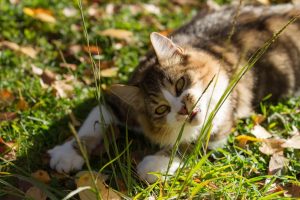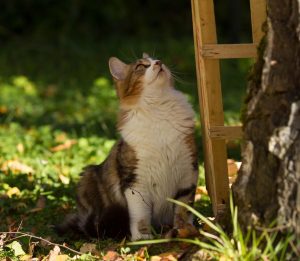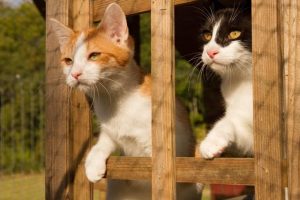Cats come in all sorts of different sizes, body shape and temperament. We love cats!
What makes cats great? Everything they do! They can be affectionate, playful, energetic and lazy.
No two cats are the same, but insight into the biology and behaviour of cats can help you to understand your pet better.
- Cats have highly developed senses
Cats can detect higher frequencies of sound than dogs or humans. They have an excellent sense of smell, superior to humans and they can see better than us in dark and dim light!
- Cats are expert hunters
Cats hunt alone – in the wild they’ll spend 6-8 hours a day hunting. They can hear the high pitched frequencies used by small rodents and their whiskers or ‘vibrissae’, are highly sensitive to vibrations, helping them to detect prey.
- Cats are agile
Cats have powerful, tightly controlled muscles and fast reflexes that allow them to move quickly and gracefully. They are skilled at running, jumping, climbing, and stealthily stalking prey.
- Cats use a range of methods to communicate
Communication sounds include purrs, ‘meows’, trills, chirrups, growls, yowls, and hisses. They also communicate visually using different body postures as well as visual markers such as scratch marks or the deposition of faeces.
- Cats are independent
Survival is a solitary affair for cats; they are self-reliant for food, shelter, grooming and territory defence. They can be social but prefer to choose their own companions.
- Cats are territorial
A cat’s territory is an area that is defended, aggressively if required, against other cats. They use a range of methods to mark their territory, including scratching, spraying urine and depositing faeces. Help keep your cat safe outside.
- Cats are meat eaters
Meat is an important part of a cat’s diet. Eating meat is important for cats; they cannot survive without the nutrients found in animal-derived materials.
- Cats love cat naps!
Domestic cats sleep for 12-18 hours a day! Sleep allows energy resources to be replenished so is vital for a predator that needs to be ready to hunt whenever it detects prey.
- Cats are playful
Cats are intelligent and need both mental and physical stimulation. Play is important as it improves motor skills, provides brain training and encourages social behaviour. Keep your cats entertained with a wide range of fun toys.
- Cats are clean animals
Tiny abrasive hooks, found on the centre of cats’ tongues, and helps them to groom themselves efficiently. Grooming keeps a cat’s coat in good condition and also helps to remove fleas and other parasites.
 Our top tips to give a cat a good home:
Our top tips to give a cat a good home:
Cats can become ill living in cold or wet places. Provide a comfortable, dry, draught-free, clean and quiet place for your feline friend to rest.
Cats need to visit the toilet easily. Give regular access to a suitable toilet place, outside or a litter tray, kept separate to their eating and sleeping areas.
Noises and objects often scare cats. They need to have somewhere to hide away from perceived danger. To prevent your cat suffering, always provide access to safe hiding places to allow him/her to escape feeling afraid.
Multiple cats need enough toys, cat beds and hiding places to allow them to get away from one another when they feel the need to be alone.
Cats are very intelligent – a bored cat is an unhappy cat. Make sure there are plenty of things to do with enough space to exercise, climb and play. Indoor cats need more to keep them entertained.

Cats are active, needing opportunities to run, jump and climb. They often feel safest when high so provide a suitable high place to climb and rest, e.g. shelves.
Make sure the size and temperature of anywhere they are left (including vehicles) is appropriate.
Cats are inquisitive so hazards at home and outside could injure them. Care for your cat by making sure your cat is in a safe, secure and hazard-free environment at all times.
Cats are territorial so become very attached to their home and environment, If you are going away, try to find someone to care for your cat at home. If boarding, ease the move by taking familiar items along, e.g. your cat’s bed/toys.
Make sure cat carriers feel secure in transport, and introductions to new surroundings are gradual. Putting familiar smelling items in carriers and new environments can help them feel more comfortable.
Cats need time to adjust and settle if you move house. They could get into serious danger trying to return to their previous home. To prevent this, keep cats indoors for at least two weeks after moving. Ensure your cat’s behaviour has settled before letting them outside.
 Housing cats in a rescue situation – what Chats du Quercy adhere to and recommend
Housing cats in a rescue situation – what Chats du Quercy adhere to and recommend
Cats are housed separately if coming in from different sources and may be separated even if they have come from the same source if they aren’t seen to be in the same social group.
For cats that have not been previously socialised to other members of their species, group housing is likely to be a constant stressor, and addition of non-social animals to a group can elevate the stress levels of the resident animals as well, this leads to constant social stress and readjustment, not to mention risk for introduction of disease. In cats specifically, addition of new cats to a group can result in more frequent aggression and can even cause sufficient stress to activate feline herpesvirus infection.
When deciding the layout of your shelter, preventing the spread of disease must be your first priority. Incoming animals must be quarantined away from animals that are ready for rehoming.
Small enclosures that meet cat needs are greatly preferable in order to allow periodic complete emptying and disinfection. They should include -:
Ample hiding and resting areas.
There should be at least as many hiding areas and elevated resting surfaces for the number of cats plus one
Ample resources
There should be one food bowl per cat to alleviate stress and ill health due to mal nourishment. The best possible food should be used, at Chats du Quercy we use Royal Canin
Enrichment materials
Such as scratching posts, perches and furniture that can be readily disinfected, discarded or given to the adoptants.
Even when housing quality is good, it’s often beneficial to provide animals with enrichment areas outside of their enclosures for exercise, play and interaction. Chats du Quercy provide 3 outside enclosures to enrich the lives of our abandoned cats.
Double doors at entry/exit points if possible.
To prevent feline escape when human visitors come in and out.





